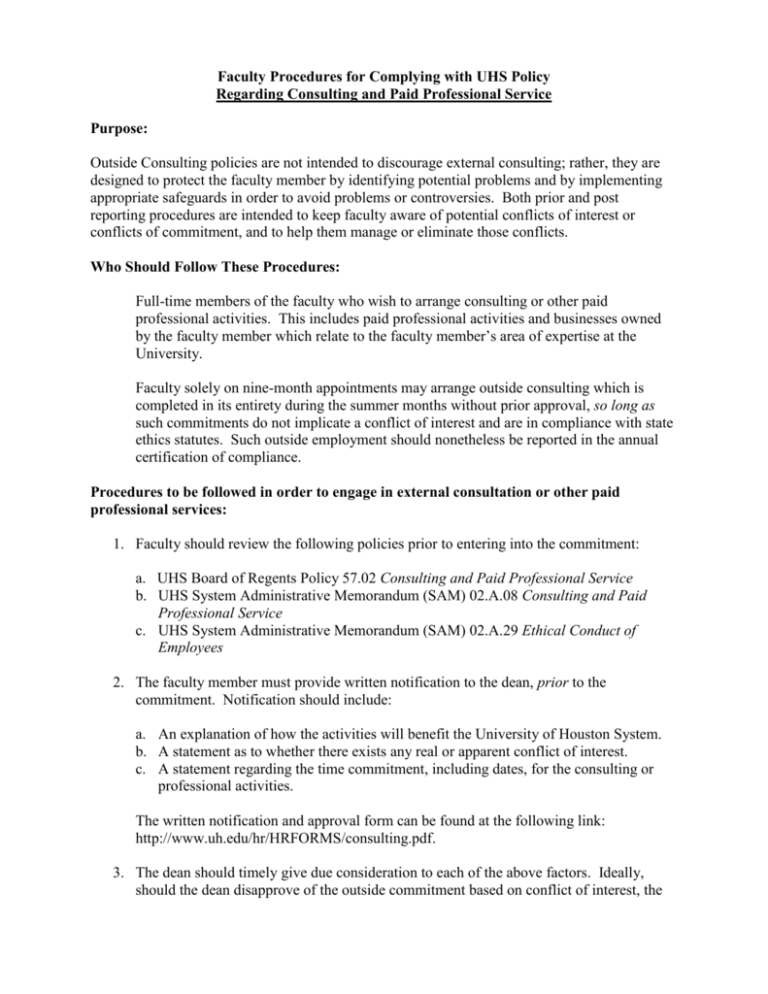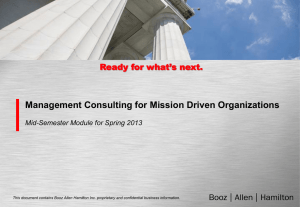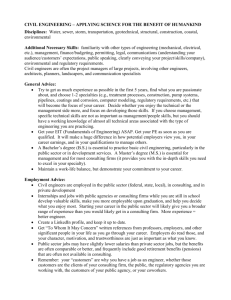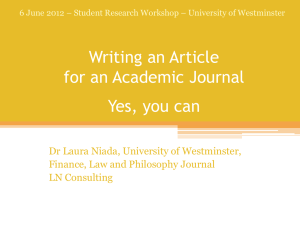Faculty Procedures for Complying with UHS Policy
advertisement

Faculty Procedures for Complying with UHS Policy Regarding Consulting and Paid Professional Service Purpose: Outside Consulting policies are not intended to discourage external consulting; rather, they are designed to protect the faculty member by identifying potential problems and by implementing appropriate safeguards in order to avoid problems or controversies. Both prior and post reporting procedures are intended to keep faculty aware of potential conflicts of interest or conflicts of commitment, and to help them manage or eliminate those conflicts. Who Should Follow These Procedures: Full-time members of the faculty who wish to arrange consulting or other paid professional activities. This includes paid professional activities and businesses owned by the faculty member which relate to the faculty member’s area of expertise at the University. Faculty solely on nine-month appointments may arrange outside consulting which is completed in its entirety during the summer months without prior approval, so long as such commitments do not implicate a conflict of interest and are in compliance with state ethics statutes. Such outside employment should nonetheless be reported in the annual certification of compliance. Procedures to be followed in order to engage in external consultation or other paid professional services: 1. Faculty should review the following policies prior to entering into the commitment: a. UHS Board of Regents Policy 57.02 Consulting and Paid Professional Service b. UHS System Administrative Memorandum (SAM) 02.A.08 Consulting and Paid Professional Service c. UHS System Administrative Memorandum (SAM) 02.A.29 Ethical Conduct of Employees 2. The faculty member must provide written notification to the dean, prior to the commitment. Notification should include: a. An explanation of how the activities will benefit the University of Houston System. b. A statement as to whether there exists any real or apparent conflict of interest. c. A statement regarding the time commitment, including dates, for the consulting or professional activities. The written notification and approval form can be found at the following link: http://www.uh.edu/hr/HRFORMS/consulting.pdf. 3. The dean should timely give due consideration to each of the above factors. Ideally, should the dean disapprove of the outside commitment based on conflict of interest, the dean’s determination should be conveyed to the faculty member prior to commencement of the outside activities. 4. In addition to the prior written notification, faculty shall report outside professional commitments as required in the annual Conflict of Interest forms each September. Written notification is not required for: 1. Unpaid public service activities and service on government review committees for a nominal honorarium and/or reimbursement for expenses, unless the service conflicts with regularly scheduled classes. 2. Occasional lectures that include fees, so long as the lecture (including travel time): a. does not require an absence of more than one day from University obligations; and b. does not conflict with regular University obligations (such as missing class). More than two such lectures per semester (or summer, if employed during the summer) are not considered occasional lectures, and therefore would require written notification and approval. 3. Paid outside activities not related to the faculty member’s area of expertise, and which are not conducted during the work week. Example, a professor who builds and sells birdhouses on weekends is not required to provide notification. Time off for this outside activity would not be allowed. Outside Time Commitments: The University recognizes and supports the concept that academic faculty work diverse hours and schedules to fulfill their commitments to teaching, research and service. The University further recognizes that outside consulting, in many cases may serve as to benefit both the faculty member and the University. Both administration and faculty members should exercise sound judgment, taking into account reasonable work schedules, in determining compliance with outside consulting policies and procedures. 1. The outside time commitment for consulting or paid professional service cannot average more than one day per calendar week, and must not interfere with regularly scheduled classes. 2. The outside time commitment within each academic period, as defined below, cannot exceed two days per week during Monday-Friday and 4 days per week if including Saturday and Sunday. Employees should request leave time without pay for outside commitments that surpass these parameters. 3. The maximum number of days per consulting period are as follows: a. Fall (September 1 – December 31): 17 b. Spring (January 1 – May 31): 21 c. Summer, if employed during summer (June 1 – August 31): 13 4. A consulting day is generally considered to be 8 hours. Limited exceptions may occur upon a showing that the exception is merited. Upon request from the Provost or his/her designee, faculty members and department chairs should be prepared to provide a more thorough explanation justifying their reasoning for claiming an exception to the general rule. 5. Faculty are expected to fully meet their instructional responsibilities and are not allowed to cancel class, skip class, or reschedule class in order to meet consulting obligations. 6. If a faculty member is on a grant at 100% time, consulting would not be allowed, except in cases where it would be in compliance with OMB circular A-21 Cost Principles for Educational Institutions. For more details on OMB Circular A-21, see the UH Division of Research website. November 15, 2012







